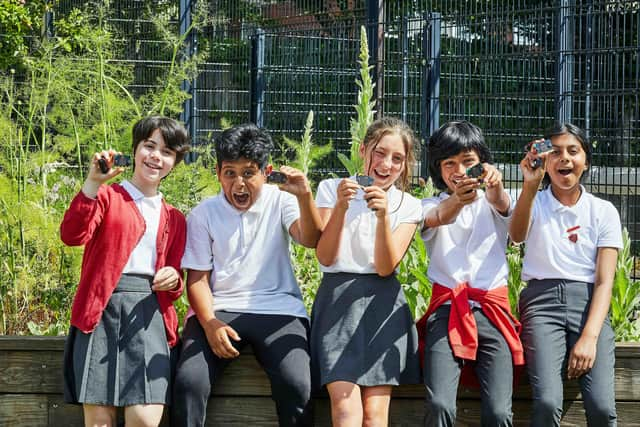Corby's RS to distribute 325,000 classroom kits as part of UK-wide initiative to help accelerate digital learning in schools
and live on Freeview channel 276
A Corby firm will be distributing 325,000 classroom kits as part of a UK-wide initiative to help accelerate digital learning in primary schools.
RS in Corby and Okdo, part of the RS Group, are manufacturing and distributing 325,000 micro:bit classroom kits to UK Primary schools free of charge.
Advertisement
Hide AdAdvertisement
Hide AdThey’ll be distributed during the 2023/2024 academic year as part of a project to arm primary school children with the digital skills to understand the world around them and shape their own digital future.


The project, BBC micro:bit – the next gen, is a partnership between BBC Education, the Micro:bit Educational Foundation and Nominet, and this month launched the donation of a set of 30 micro:bits to every primary school across the UK that registers to receive them.
The micro:bit classroom kits contain a pocket-sized micro:bit computer designed to inspire creative thinking in children, which has multiple uses and can be programmed in many ways.
The classroom kit will be provided alongside free teaching resources and training to support them in getting the most out of their classroom kits.
Advertisement
Hide AdAdvertisement
Hide AdResearch suggests that 65 per cent of primary school children will end up working in jobs that do not exist today.
BBC micro:bit – the next gen will support primary school children and teachers in this transition to future digital careers by accelerating computational thinking, programming, digital creativity and machine learning skills.
Nicki Young, group chief digital & innovation officer, and president of OKdo, said: “This initiative is a game-changer and is setting the bar at new heights, transforming how digital skills are perceived and taught across primary schools in the UK and bringing digital inspiration to young people at their most formative age.
“We are delighted to be part of it and are hugely excited about the impact this will have on so many young people today, many of whom may become the engineers of the future.
Advertisement
Hide AdAdvertisement
Hide Ad"We are proud to be involved in putting them on the very first step of their digital journey.”
By using the micro:bit, children are encouraged to explore ideas using real code.
The device provides an authentic experience of the interaction between hardware and software and gives children practical computer knowledge.
Using it, they can see how and what they do with the code on-screen has a direct impact on the device they're holding in their hand.
Advertisement
Hide AdAdvertisement
Hide AdTeachers are being supported with free teacher training courses across the nations, webinars and classroom resources.
As a global manufacturing and distribution partner of micro:bit the role of RS Group and OKdo in this initiative is two-fold: the manufacturing of the microbit classroom kits is being carried out in OKdo’s recently announced manufacturing CEM partner in Poland, and the distribution will be executed from RS’ Distribution Centre in Corby.
Approximately 500 classroom kits will be assembled, packed and despatched each day from Corby in the coming months.
Schools are being invited to register their interest in the classroom kits and orders will be created on the back of these registrations, using a bot which has been built by RS’ own automation team.
Advertisement
Hide AdAdvertisement
Hide AdNicki said: “While BBC micro:bit – the next gen project resonates at the sweet spot of our ‘making amazing happen for a better world’ purpose, this is a first for us and has not just been a huge collaboration across multiple teams, but also a real logistical feat in terms of scale.
“The project has a real halo effect as it enables us to capture the data and details of all the schools and teachers, so we can follow up and offer further education materials and other products to support them ongoing and in the future.”
Over the past few months, schools across the UK have been encouraged to order their micro:bit classroom kits.
The first of the kits are now being dispatched to schools and roll-out will continue until February/March 2024.
Advertisement
Hide AdAdvertisement
Hide AdWilliam Fawcett, eight, is no stranger to the micro:bit computer. His mum, Sarah Fawcett, said: “We have had some great fun together looking at how we can use the micro:bit at home.
“So far, William and I have built a small robot using a kit with the micro:bit which can detect when it’s going to walk into a wall, and it changes direction. We have also coded the micro:bit to become a pedometer.
“It’s been brilliant watching and observing him. While he essentially sees this as play, I can see each step of the way that he is testing out and exploring his creativity and digital skills.”